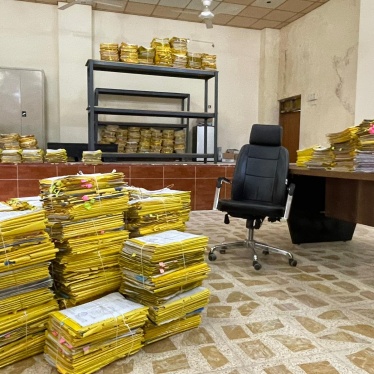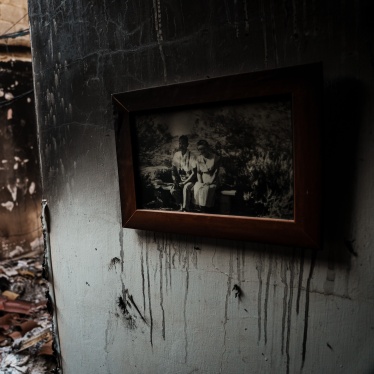Abdolreza Rahmani Fazli
Minister of Interior
Islamic Republic of Iran
Dr. Aziz Kazemi
Director-General of Bureau of Alien and Foreign Immigrant Affairs
Islamic Republic of Iran
Your Excellencies:
Human Rights Watch is an independent international organization that monitors human rights in more than 90 countries around the world. We are currently preparing a report about the situation of Afghan nationals, including refugees, in Iran. It documents a range of rights violations by Iranian authorities against Afghan nationals. Between April 2012 and August 2013 we conducted more than 80 interviews with Afghans who were deported from Iran to Afghanistan, representatives of the United Nations, non-governmental organizations, and the Afghan government.
We write this letter to request permission for a Human Rights Watch delegation to visit Iran to meet with you to discuss the main findings of our research on the human rights situation of Afghan refugees and migrants in Iran. The intention of the visit is to complement our research with interviews with government officials and non-governmental organizations working to improve the situation of Afghan migrants and refugees in Iran, in order to ensure that government views are fully incorporated into our report.
Iran has shouldered a heavy burden absorbing a large influx of Afghans since the 1980s, and the country has implemented many favorable policies vis-à-vis Afghan refugees and migrants with minimal support from the international community. We recognize that Iran is well within its sovereign rights to deport and refuse admission to nationals of other countries who do not have permission to enter or to stay who are not in need of international protection. We also recognize that in 2003, Iran registered over 800,000 Afghans as refugees, under its Amayesh registration system.
However, our research findings suggest that in recent years the government’s treatment of its Afghan population has failed to meet standards spelled out in international conventions, including states’ obligations under the 1951 Refugee Convention and its 1967 Protocol, which the Iranian government has signed and ratified. These failures include the lack of a domestic refugee law and asylum procedures to implement Iran’s obligations under the Refugee Convention; the lack of access for newly arriving Afghan asylum seekers to register as asylum seekers or other protected status; unreasonable barriers obstructing Afghans’ access to humanitarian aid and social services; arbitrary arrest and detention of Afghans; and impunity for government and non-state actors’ abuses against Afghans.
The major findings of our research into the treatment of Afghan refugees and migrants in Iran are as follows:
-
Lack of Fair and Transparent Asylum Procedures and No Right to Challenge Deportation to Afghanistan: Afghans arriving in Iran today have virtually no opportunity to lodge asylum claims or register for other forms of protection based on country conditions in Afghanistan. Afghan asylum seekers should be able to lodge asylum claims with Iran’s Bureau of Aliens and Foreign Immigrant Affairs (“BAFIA”), the agency charged with processing refugee claims, but it is virtually impossible for newly-arriving Afghans to lodge claims because there are no fair and transparent asylum procedures in place for Afghans. Other Afghans who have been in Iran for years or even decades are also unable to lodge claims. Afghans being deported from Iran, including people who may face persecution or serious harm upon return, are given no opportunity to challenge their deportation.
-
Difficulties Retaining Refugee Status: Afghans registered as refugees under the Amayesh system face an increasingly complex process to retain that status, including frequent re-registration with relevant government agencies, a lack of official assistance for those with limited literacy who struggle to understand bureaucratic procedures, and onerous fees, which many poor refugees cannot afford. Afghans have told Human Rights Watch that the smallest technical errors, including mistakes during the registration process, can result in the permanent loss of refugee status.
-
Concerns Regarding “Voluntariness” of Changing Refugee Status: Our research indicates that Iranian authorities have used numerous government initiatives in recent years, including the Comprehensive Regularization Plan (CRP) aimed primarily at providing temporary residency and work visas to undocumented foreign nationals, to convince Afghans to give up their protected refugee status. These programs may have resulted in the forced repatriation or return to Afghanistan of these refugees without their informed consent.
-
Discrimination and Restrictions on Afghan Nationals: Afghan nationals in Iran face severe restrictions on freedom of movement, as well as arbitrary limits on access to education, employment, Iranian citizenship, and marriage rights. All foreign nationals are subject to travel restrictions in many areas of the country, but such restrictions are particularly burdensome for Afghans as compared to others. In some cases, Human Rights Watch documented refoulement of refugees who were alleged to have violated such travel restrictions. Iranian rules restrict Afghans with legal immigration status, regardless of their educational or professional qualifications, to categories of employment that are menial and/or dangerous.
- Abuses During the Deportation Process: Afghans with or without legal status who are deported are routinely at risk of police abuses, including violence, theft, demand for unreasonable fees related to their deportation, forced labor during detention prior to their deportation, and poor conditions in detention facilities. A particular concern is the lack of protection for unaccompanied migrant children during the deportation process.
We plan to officially release our findings in the coming months in the form of a report. We hope you will grant Human Rights Watch permission to visit Iran to conduct meetings and any additional research that may be necessary prior to the release of the report, and would very much welcome efforts by your government to allow us to release the report in Tehran. Even if you do not authorize our visit, we would appreciate your responses to the questions raised below, as well as any additional information you wish to provide us.
Human Rights Watch strives to reflect all perspectives in our research and looks forward to your response. In light of our publishing schedule, we would be grateful to receive your response by November 3 or your earliest convenience.
Sincerely,
Joe Stork
Acting Director, Middle East and North Africa Division
Human Rights Watch
Questions:
1. Can you provide information regarding a) the total number of refugee or asylum requests submitted by Afghan nationals since 2003 and b) the total number of Afghan nationals issued Amayesh cards or some other form of asylum protection who entered the country in 2003 or thereafter. What efforts has your government made to ensure that Afghans entering the country or facing deportation who fear persecution or other forms of harm in Afghanistan can apply for asylum or other protected status, such as Amayesh status?
2. Has your government agreed to extend the temporary visas of the several hundreds of thousands of Afghans registered under the Comprehensive Regularization Process (CRP), which was due to expire on September 6, 2013, or suspend their deportation, or provide them with an opportunity to lodge asylum claims if they wish to do so? If the answer is no, could you provide us with relevant details regarding how your government plans to protect them from unlawful return to persecution or other forms of harms they may face if they are deported to Afghanistan?
3. Absent a guarantee that Amayesh cardholders who agree to give up their refugee status and instead register under the CRP will have their CRP status renewed for the next few years, what guarantee has Iran given such people that they will be allowed to re-register for Amayesh cards or lodge asylum claims if their CRP status is not renewed?
4. What efforts has your government made to ensure that Afghan refugees registered under the Amayesh system are not refouled, and that repatriation of Afghan refugees who were formerly registered under the Amayesh system but who gave up their status is, in fact, voluntary, fully informed, and free of coercion?
5. What efforts has your government made to ensure that Afghans, especially children, are not subject to physical and verbal abuse, ill-treatment, or harassment by police and guards in police stations and detention facilities and during the deportation process?
6. What efforts has your government made to ensure that Afghans are not subject to abuse, including unlawful discrimination and violence, by non-state actors?






